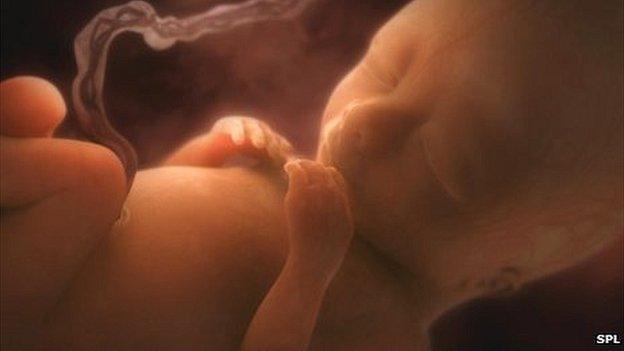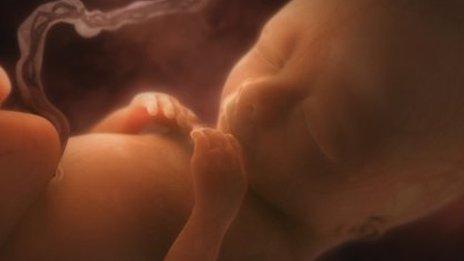Criticism over NHS Down's syndrome test availability
- Published
It is hoped the screening will be available to all next spring
A new screening test for Down's syndrome is still not available across the Welsh NHS, six years after guidelines said it should be.
In 2008 the National Institute for Health and Care Excellence (NICE) said all pregnant women should be offered the ultrasound scan and blood test.
But currently only patients in north Wales are offered screening.
The Welsh government said introducing the test across Wales had been "challenging".
The guidelines recommended that all pregnant women are offered a combined ultrasound and blood test which identifies the risk of having a baby with a genetic condition caused by abnormal chromosomes, including Down's syndrome.
'Alarmed'
Dr Bryan Beattie, a consultant in foetal medicine at the University Hospital of Wales, Cardiff, said he expected the combined test to be rolled out across Wales from September to November.
He said: "It has been incredibly slow. A lot of mothers who have given birth to a baby with Down's syndrome over the last six years would not have had an opportunity for a combined test.
"The other even sadder thing is that some mothers unnecessarily miscarried a healthy baby [after an amniocentesis].
"They would not have been wrongly flagged up as a high risk if they had had the combined test."

Introducing the screening test has been complex and challenging for health boards, ministers say
Jane Fisher, director of Antenatal Results and Choices (Arc) said: "We're alarmed that it's taking so long to roll out in Wales.
North Wales Conservative AM Antoinette Sandbach said: "While I am pleased for my constituents, that finally the ultrasound test has been introduced in north Wales, patients in the rest of Wales still face the same dilemma, either to go private or face an out-dated and far more invasive test on the NHS," she said.
In a written answer to Ms Sandbach, Health Minister Mark Drakeford said the screening was being introduced in a "phased manner".
"Implementing this screening test is complex and has proved challenging for health boards," he said.
Mr Drakeford said the additional work required more from midwives, obstetrics and radiology departments, together with upgraded radiology information management system software.

Down's syndrome
Down's syndrome is a congenital disorder resulting from an extra copy of one chromosome.
This generally causes some level of learning disability and a range of distinctive physical features.
In the UK, 750 babies are born with Down's syndrome each year and screening tests are available for pregnant women.
There are an estimated 60,000 people in the UK living with Down's syndrome.

Testing for chromosomal abnormalities
There are two types of tests available on the NHS to test for conditions caused by a fault in a foetus's chromosomes.
The recommended test involves an ultrasound which measures the thickness of fluid at the back of the baby's neck and is known as a nuchal transparency scan. If the fluid is thicker than the norm, it can be an indicator that the foetus has a chromosomal defect, although not all higher readings will mean this.
At the same time, a blood test is done measuring proteins in the mother's blood which are associated with pregnancy. An abnormal level can also indicate problems.
This is carried out between 11 weeks and 14 weeks.
If the combined test is not done, a woman can have a different blood test known as the quadruple test at between 14 weeks and 20 weeks.
Both types of test are combined with the mother's age to produce the individual chance of having a baby with a chromosomal abnormality (for example 1 in 500).
The only two ways to diagnose Down's Syndrome and other genetic conditions is to either have a procedure known as chorionic villus samplin from 11 weeks or an amniocentesis test from 15 weeks, both of which involve passing a needle into the womb and either removing a sample of the placenta or amniotic fluid.

- Published29 August 2010
- Published24 May 2014

- Published25 November 2013
